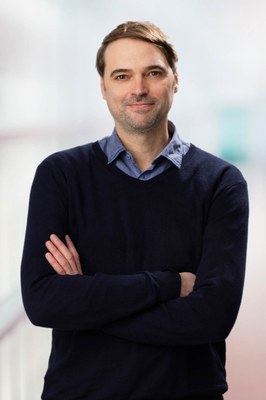Jürgen Kleine-Vehn is the new speaker for Freiburg’s CIBSS Cluster of Excellence
Freiburg, Mar 04, 2024
The CIBSS Cluster of Excellence researches the signalling processes that enable cells to coordinate their activities, form tissue and adapt to environmental conditions. The goal of CIBSS is to communicate in this ‘language of life’, in other words, to understand the processing of signals within cells and tissue, and thereby manage to control them precisely. There are more than 70 research groups working on this in interdisciplinary projects. Kleine-Vehn heads the Cluster of Excellence together with Professor Wolfgang Driever and Professor Carola Hunte.
Professor Kleine-Vehn, what do you find particularly exciting about biological signal research and your new role as speaker for the CIBSS Cluster of Excellence?
What I find exciting about it is the complexity of the processes that we study. Every time we’ve made a fundamental step, we learn that there is much more to discover. So like an everlasting puzzle, we’re diving ever deeper into the material. It fascinates me.

Jürgen Kleine-Vehn. Photo: Jürgen Gocke
With my work group, I research how plants respond to external signals. Plants function totally differently to us humans, for example: after embryonic development we already have all our body parts. Plants on the other hand are always forming new organs as they grow. So they constantly have to integrate all the signals they perceive, and take decisions as a result. It’s still not well understood how this functions. As a child I’d have loved to have been an explorer, but at some point I realized: all the continents have been explored! So astronaut might still have been an option. But what I’m doing now is no different. We’re looking into cells to discover something that no one has seen before. And we are doing that with an incredibly interesting green organism, which unlike us sometimes gives the impression of having come from another galaxy.
My new role as CIBSS speaker excites me because I will be working even more closely than before with colleagues from different disciplines. Each niche of research has something like its own language. Every day in CIBSS we break through the boundaries that arise from this, and develop a common academic language. I believe there is massive additional value from rethinking research in this way. We’ve all got a lot of detailed knowledge in our respective subjects and strong networks there. But we often stick within our own field. That is what is beautiful and exciting about CIBSS: if you chat with two or three different people, you are instantly talking about two or three different fields of research. It’s enormously motivating, and I’ve discovered solutions that I could not have found on my own.
What are the current challenges you are working on and what might a solution look like?
On a personal level, it’s definitely time management in my new role (laughs). In my own research, however, I naturally encounter a lot of challenges too: I’m mainly working on a specific plant hormone, auxin. It plays a part in a lot of processes. This means my research group’s projects often extend into new fields. So we’re constantly having to acquire new knowledge and work together with other groups. Of course, we’ve always done that, and we have strong international networks too. But this is usually on a one-off basis – that is, someone asks “can you give me feedback?”, or “Can you run a specific experiment for us?”. Interdisciplinary research collaborations like CIBSS offer different opportunities and are an important answer to such challenges. The constant exchange I experience in CIBSS, and the fact that other members are always bringing in new points of view, it brings an entirely new dimension to the science.
I can also see challenges in my role as speaker. I see myself as a representative of the many areas of research of the Cluster. Normally, you only represent your own research or field of research – now it’s a lot broader. But I think that’s totally positive and believe I’m already growing personally.
What’s it like to research at the University of Freiburg and what do you like most about it?
When I take my son to kindergarten, I always meet other researchers and chat for example with a chemist and a doctor. Naturally we talk a lot about our children, but also about science. And the randomness of these exchanges, I really like that.
I also have the impression that there is a very great respect for plant science issues here. And for me as a plant scientist to have such good links with other faculties such as chemistry or medicine wasn’t always a matter of course, as it is here in Freiburg. I first moved to Freiburg in 2021, so CIBSS already existed. This meant that from the beginning I was involved in this highly interdisciplinary research environment and from the beginning very much enjoyed the experience of this interdisciplinary scientific culture.
What’s your favourite place in Freiburg?
During the working day, I think it is lovely to have the botanical garden right in front of the institute’s door. I love to spend time there, especially in spring or summer, either for lunch, or just from time to time to read publications.
Contact:
Office of University and Science Communications
University of Freiburg
Tel.: 0761/203-4302
e-mail: kommunikation@zv.uni-freiburg.de

